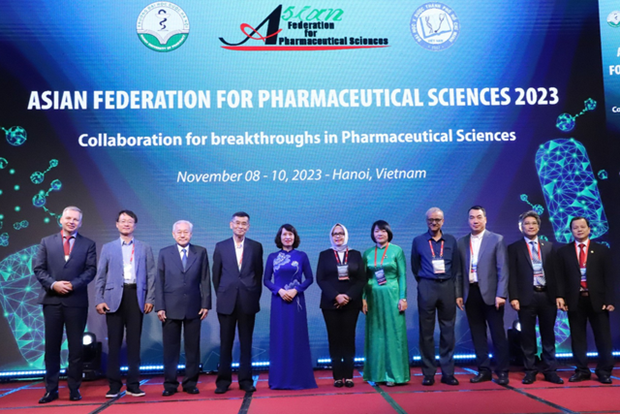 Society
Society


|
| This is the first time that the Asian Forum on Pharmaceutical Sciences is held in Hà Nội. Photo baochinhphu.vn |
HÀ NỘI The 2023 Asian Forum on Pharmaceutical Sciences (AFPS) with the theme "Collaboration for Breakthroughs in Pharmaceutical Sciences" commenced yesterday in Hà Nội.
The event is organised by the Hà Nội University of Pharmacy in collaboration with the Asian Federation for Pharmaceutical Sciences and the University of Medicine and Pharmacy at Hồ Chí Minh City from November 8th to 10th.
The AFPS, the largest pharmaceutical-specialised conference in the Asia-Pacific region, is held every two years, bringing together delegates from 24 member countries of the Federation, with this year's conference attracting over 500 in-person participants and nearly 100 online attendees from both domestic and international locations. Among them, nearly 200 delegates come from 26 countries and territories, and 350 presenters contribute oral and poster presentations.
Speaking at the opening session, Nguyễn Thị Liên Hương, Deputy Minister of Health, stated that according to the Research Report on Việt Nam's Pharmaceutical Industry, as of 2022, the total value of Việt Nam's pharmaceutical market had reached nearly 7 billion USD, with a compound annual growth rate of 10.6%. Per capita pharmaceutical spending stood at 75 USD.
Currently, Việt Nam boasts 228 drug manufacturing companies that meet GMP (Good Manufacturing Practice) standards, including 17 facilities certified with EU-GMP, equivalent to PIC/S-GMP.
The Vietnamese pharmaceutical industry is now at a quasi-level 3 stage, with 90% of raw materials being imported. It focuses on the production of generic drugs and exports a variety of pharmaceuticals.
Overall, the pharmaceutical market remains relatively stable, and the category of medicines for treating patients is consistently priced lower than the general consumer price index. Medication prices in Việt Nam are among the lowest in the region.
Hương emphasised that the Vietnamese government, in its pursuit of sustainable development in the pharmaceutical sector, has approved the National Strategy for the Development of Việt Nam's Pharmaceutical Industry up to 2030 and the vision to 2045, as outlined in Decision 1165/QD-TTg dated October 9, 2023.
This conference, along with the accompanying events, serves as a platform for sharing, knowledge exchange, and updating experiences among scientists, healthcare professionals, pharmaceutical manufacturers and policymakers. The goal is to work towards a sustainable healthcare system, institutional improvement, legal frameworks, investment and enhanced competitiveness, fostering collaboration and participation in the pharmaceutical value chain. The focus also lies on enhancing management capabilities, controlling the pharmaceutical market and ensuring the appropriate, safe and effective use of medicines.
Nguyễn Hải Nam, Rector of Hà Nội University of Pharmacy, shared that the development of a new drug requires the involvement of numerous scientists from various fields. Even after a drug is introduced, research and monitoring continue to ensure safe and effective usage, manage treatment costs for patients, and create appropriate policies that balance the interests of all parties.
Pharmaceutical Science is not a singular field but rather a multidisciplinary domain. From the 19th century, the advancement of synthetic chemistry contributed to the discovery of new drugs that could be manufactured on a large scale, leading to the pharmaceutical industry.
In the 20th century, molecular biology and genetics deepened our understanding of disease mechanisms and causes. This led to fundamental changes in current drug research and development. The focus shifted towards targeted therapies aimed at the molecular causes of diseases. As a result, highly specific, less toxic, and less side-effect-laden drugs have been created.
During the conference, delegates presented and discussed topics within six specialised pharmaceutical areas: clinical and social pharmacy and pharmaceutical management; pharmacology and biomedical sciences; drug research and development; drug formulation and distribution systems; natural compounds and traditional medicine; and pharmaceutical analysis, biopharmaceutics and biosimilars. VNS




